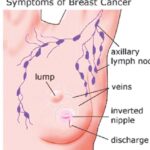Women who have more than three sugary drinks a week may have an increased risk of developing breast cancer, a study has found.
Researchers found that the more sugary drinks consumed by the women in their study, the greater the density of their breasts – a known risk factor for cancer.
Dense breasts have less fatty tissue and more of the gland tissue that makes and drains milk as well as supportive tissue that surrounds the gland.
Women with dense breasts have a higher risk of developing cancer because there are more cells that can become cancerous.
Their cancers are also more likely to be missed because any areas of abnormal tissue are harder to spot during mammogram screening.
Lead author of the study, Dr Caroline Diorio from Laval University in Quebec, said: ‘We know that worldwide consumption of sugar has increased and the findings of this study show what effect that type of diet could have on breast density, one of the strongest indicators for breast cancer risk.’
For the study, 1,555 women – half of whom were pre-menopausal and half of whom were postmenopausal – answered a questionnaire about how often they drank sugar-sweetened fruit juice and fizzy drinks. A serving was 355ml, about the size of a normal can of fizzy drink.
Their breast density was then measured through mammogram screening.
Dr Diorio said: ‘Among all women, those who had a sugary drink intake of more than three servings per week had a mean of 29.6 per cent in breast density but those who did not drink this type of drink had a mean of 26.2 per cent in breast density.
‘An increase of about three per cent in breast density is not negligible in terms of breast cancer risk.
‘By comparison it has been shown that healthy women at high risk of developing breast cancer who received (the breast cancer drug) tamoxifen for four-and-a-half years had a reduction of 6.4 per cent in breast density, and it has been observed that tamoxifen can reduce the risk of breast cancer by 30-50 per cent in high-risk women.’
It’s thought that sugar can enhance cell growth, and therefore, density in breast tissue.
Dr Diorio concluded: ‘Considering the worldwide increase in sugar consumption and all the health problems it is related to, it is important to continue research on this subject and begin to inform the public about the adverse effects of sugar consumption.’
The study was published in the journal BMC Public Health.
Source: GhanaWeb












